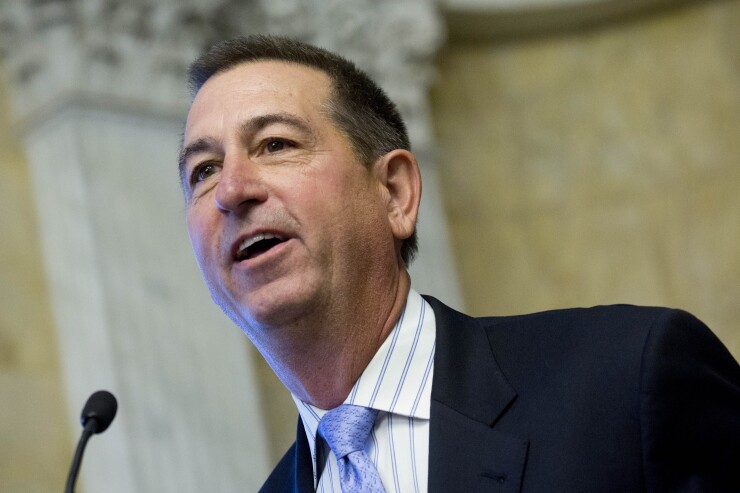Regulators plan to have "an interagency redo" of Community Reinvestment Act rules out for distribution by the end of March, Comptroller of the Currency Joseph Otting said Tuesday.
Speaking at a securitization industry conference in Las Vegas, Otting said reform of CRA regulations is a "key element" of how regulators are aiming to recalibrate rules a decade after the financial crisis.
“We want to have a … measuring system so that there is no doubt about whether banks are in compliance,” Otting said of the CRA compliance process.

He described the effort as one of several ways that regulation could be dialed back.
“I don’t think there is any doubt” that the pendulum has swung too far in the direction of regulation, Otting said in response to a question from the head of the Structured Finance Industry Group.
During the financial crisis, “regulators had to react almost like firemen running into a building to figure how to get banks through that period,” Otting said. But “tempo is important," he added. "Most banks will say the tempo is different [now]. There is more of a partnership with banks, as opposed to dictatorship.”
Otting said the Office of the Comptroller of the Currency is also working with the Financial Crimes Enforcement Network on ways to give banks "variances" in complying with the Bank Secrecy Act, while still preventing bad actors from using the banking system to launder money.
“Most banks say they spend $5 million to $7 million on [BSA] compliance,” Otting said. Allowing banks more flexibility “would free up capital and [allow] bank management to interact more with their customers to figure how to grow their business, as opposed to being inwardly focused,” he said.
Another area Otting would like to give banks more leeway to act is in small-dollar consumer lending. “We’ve seen the negative consequences of the payday lenders and check-cashing companies ... that have filled that void,” he said. “I’m not saying that all payday lenders are bad; it’s a big market that is incredibly underserved.”
While many of the consumers who use small-dollar credit are subprime, Otting said, they may be better served by banks that can help them improve their credit scores as opposed to nonbanks that may not report loan payments to credit bureaus.
“We’re comfortable with banks going down in FICO [for small ticket consumer loans] in a thoughtful way,” the comptroller said, and with “a mission to get these consumers into mainstream credit.”
"Banks can take someone with a 580 FICO and get them to 680,” Otting said, whereas with using a payday lender, “you are never going to improve your credit score, even if you make all your payments."
While revamping rules generally requires coordination among several banking regulators, Otting suggested that regulators might be more willing to act on their own than in the past.
“The market tells us want it wants the FDIC, the Fed and the OCC to move in unison, because the downside of [not doing so] is the lowest common denominator,” he said. “Historically, the market does not like lone-wolf [regulators] ... but in the future we may see more agencies taking a position and move forward for banks that they supervise.”





